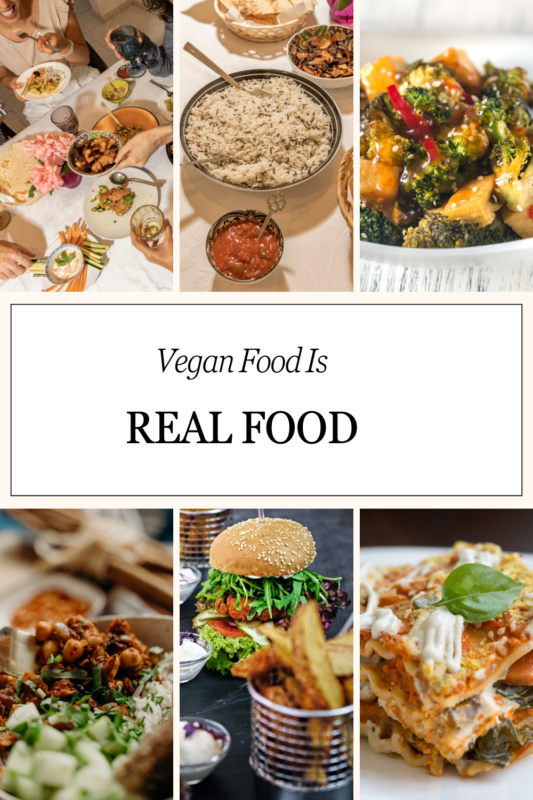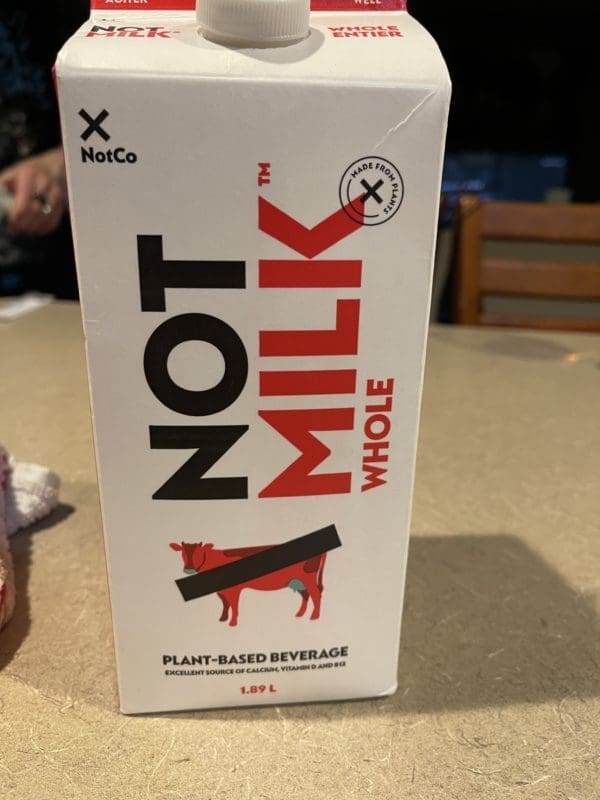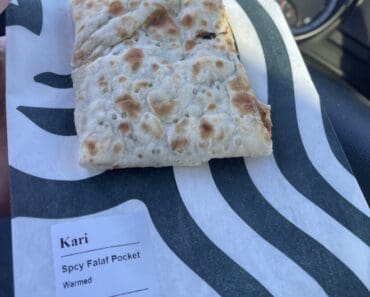Last Updated on December 20, 2023 by Kari
I get told that I eat fake food a lot. It seems to be a common way of describing vegan food nowadays – even for vegans. And it needs to stop. Even though I know that I’m not eating fake food, I also know that nobody wants to eat fake food, so if anyone is thinking about becoming vegan, the term ‘fake’ could cause them to not try.
Vegans Eat Real Food: They Just Don’t Eat Animal Products

Vegans eat real food. Even though many people will put ‘fake’ meat or ‘fake’ cheese in the description of certain vegan foods, the foods are not ‘fake’ by any means. It’s the wrong word to use. I think the best word would simply be ‘plant-based’.
‘Fake’ is just one of the unhelpful descriptions used for plant-based or vegan food. Other words include ‘substitute’ and ‘imitation’. These descriptions can be misleading and can leave people with the impression that vegan food is somehow inferior.
I recently saw someone’s description challenged in a Facebook post for vegan cheese. Someone who has been vegan for over 8 years had created a recipe for vegan feta, and in the description, they put ‘It tastes like REAL feta cheese!’ In the comments, one woman asked if it was plastic? The poster was confused and said ‘I don’t understand. Why would it be plastic?’ and the commenter said because you wrote that ‘it tastes real’, implying that it’s not a real food. While the original poster meant to convey that it tasted like dairy feta, her choice of words made the vegan feta sound like an inferior product that was trying to live up to ‘real feta’.
There is dairy feta and there is vegan feta, and one is not more real than the other. One may have been around longer, but they are both real food.
Why Do People Want Plant-Based Alternatives To Meat And Cheese?
One of the biggest questions I see is why people want ‘fake’ meat or cheese.
A lot of people pick up a vegan diet for ethical or environmental reasons. Even though they like dairy cheese or eating the taste of animals, they no longer want to eat that way for a variety of reasons. But they still want to have the same type of foods they are used to.
And some people have health concerns and want to incorporate more plant-based options into their diet. They may not necessarily be vegan, but they see the benefits of reducing or eliminating animal products from their meals. Again, they still want to eat the same type of foods they are used to.
Regardless of the reason, there is a growing demand for alternatives to meat and cheese that are made from plants. And these alternatives are just as much real food as their animal-based counterparts.
Are Plant-Based Products Healthier Than Animal Products?
There is often a misconception that plant-based products are automatically healthier than animal products. While incorporating more plants into your diet can have many health benefits, it’s important to note that not all plant-based options are created equal.
For example, a plant-based burger made from processed ingredients and loaded with sodium and preservatives may not be healthier than a grass-fed beef burger.
That being said, choosing whole, unprocessed plant-based foods can have numerous health benefits such as lower cholesterol and blood pressure levels, improved digestion, and increased energy. And there are lots of whole unprocessed options out there.
It’s all about making informed choices and finding a balance that works for you.
How To Include More ‘Real Food’ In Your Diet As A Vegan
Some tips for incorporating more plants into your diet include trying new recipes with vegetables as the main focus, swapping out meat for plant-based proteins like beans and tofu, and choosing whole grains over refined carbohydrates. It’s also important to make sure you’re getting enough essential nutrients, such as protein, iron, and B vitamins, through a varied and well-balanced diet.
Using nuts or tofu recipes to replace cheese sauces and spreads is a great way to add more healthy fats and protein into your meals.
I would recommend getting yourself some good vegan cookbooks or following some vegan websites to help you start cooking real food as a vegan so that you can start to figure out what works best for you. Soon you will know what foods you like the best and how you can incorporate them into your meals.
Examples Of Real Vegan Foods
In the coming year, I plan to review a lot of vegan recipes because we are getting a ton of vegan cookbooks for Christmas this year. I’m looking forward to eating all the food and helping people understand that if they want to go vegan, there are still plenty of ‘real’ foods out there that they can eat.
Some examples of vegan foods that are real include:
- Quinoa and vegetable stir-fry with tofu
- Perogy pizza with vegan cheese sauce
- Lentil soup with fresh vegetables and whole grain bread
- Portobello mushroom burgers topped with avocado, tomato, vegan mayo, creamy jalapeno cashew cream, and lettuce on a whole wheat bun.
- Veggie-packed smoothies made with fruits, leafy greens, and plant-based milk.
- Roasted chickpea and vegetable curry over brown rice
- Stuffed bell peppers with quinoa, black beans, corn, and salsa.
- Nut butter and banana sandwiches on whole grain bread.
- Veggie sushi rolls with avocado, cucumber, carrot, and tofu or tempeh.
- Black bean tacos with lettuce, tomato, salsa, vegan nacho cheese, and guacamole in a corn tortilla.
- Veggie and bean chili served with whole grain crackers or cornbread.
- Bean curry with naan.
I definitely eat more as a vegan than I did before going vegan. I enjoy food more.
The possibilities for ‘real’ food are endless. I’m excited to get cooking for the year to come.


